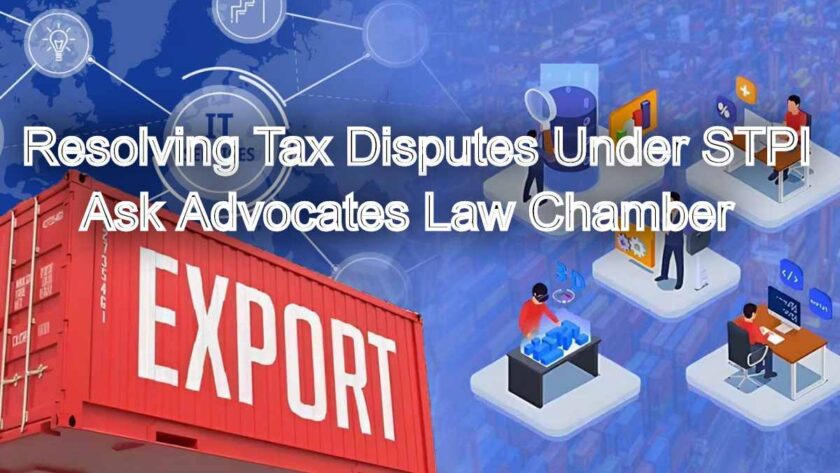Resolving Tax Disputes – Taxation is a complex subject. When it intersects with technology and export incentives, the issues become even more intricate. One such area is the Software Technology Parks of India (STPI) scheme. Many businesses in the IT and IT-enabled services sector benefit from the deductions provided under Section 10A and Section 10B of the Income Tax Act. However, disputes often arise when authorities interpret these provisions differently. At Ask Advocates Law Chamber: The Best Global Force In Legal Defense, we help clients navigate these challenges with clarity and precision.
Resolving Tax Disputes Under STPI: Navigating Section 10A/10B Challenges: Ask Advocates Law Chamber
Understanding STPI and Its Purpose
The STPI scheme was introduced to promote software exports from India. It allows companies registered under it to enjoy tax holidays for a specific period. Under Section 10A and Section 10B, units engaged in export of computer software and related services can claim deductions on their profits derived from exports. The goal is to boost competitiveness, encourage investment, and generate foreign exchange.
Yet, while the objective is clear, the interpretation of these provisions has led to numerous disputes. Tax authorities, auditors, and appellate forums often differ in their approach. Consequently, businesses must remain vigilant and proactive in protecting their rights.
Section 10A and Section 10B in Brief
Section 10A primarily applies to units established in free trade zones, export-oriented undertakings, and technology parks. 10B is more specific and relates to 100% export-oriented undertakings. Both sections offer similar deductions, but the eligibility criteria, procedural compliance, and time limits differ.
A common issue arises when authorities question whether certain receipts qualify as export profits. Another frequent concern is whether losses incurred by one unit can be adjusted against profits of another. These disputes can have a direct impact on a company’s bottom line, making it critical to address them with a strong legal defense.
Common Disputes Faced by STPI Units
Dispute Over Eligibility
Often, authorities dispute whether an undertaking is a new unit or a reconstruction of an old business. This distinction is vital because reconstructed businesses may not qualify for deductions under Section 10A or 10B. Companies must maintain clear documentation and demonstrate independence in infrastructure, employees, and operations.
Dispute Over Nature of Services
Another dispute involves whether services provided fall within the scope of “computer software” or “IT-enabled services.” As technology evolves, the definition becomes broad. However, tax officers sometimes take a narrow view. Legal intervention ensures that broader judicial interpretations are applied in favor of taxpayers.
Transfer Pricing and Export Turnover Issues
Authorities often challenge the computation of export turnover and total turnover. They exclude certain expenses like foreign currency expenses incurred for technical services rendered abroad. However, courts have clarified that if expenses are excluded from export turnover, they must also be excluded from total turnover. Despite such rulings, authorities continue to raise disputes.
Allocation of Profits
When a business has multiple units, disputes arise over allocation of profits between eligible and non-eligible units. Authorities may attempt to reduce the deduction by altering the allocation method. Strong financial records and expert legal representation can counter such arbitrary adjustments.
Litigation Risks and Consequences
Disputes under Section 10A and 10B often proceed through lengthy litigation. They move from assessment officers to appellate authorities, then to the Income Tax Appellate Tribunal, and sometimes even to High Courts or the Supreme Court. This journey consumes time, resources, and management bandwidth.
If disputes are not managed properly, companies face the risk of heavy tax demands, penalties, and interest. These demands can create financial stress and affect investor confidence. Therefore, timely legal assistance is not just useful but essential.
Strategies to Resolve Disputes
Maintain Proper Documentation
The foundation of any legal defense lies in proper documentation. STPI units must preserve invoices, agreements, and export-related approvals. Every deduction claim should be backed by evidence that can withstand scrutiny.
Adopt Consistent Accounting Practices
Authorities often challenge inconsistencies in accounts. Therefore, businesses must adopt consistent accounting practices, particularly in computing export turnover and profits. Clear segregation of expenses avoids unnecessary disputes.
Use Judicial Precedents
Many courts have already clarified issues related to Section 10A and Section 10B. Citing favorable judicial precedents during assessments and appeals strengthens the case. Legal experts ensure that the right precedents are applied.
Engage Legal Experts Early
Many businesses approach legal counsel only at the appellate stage. However, engaging experts during the assessment itself prevents disputes from escalating. Early intervention helps frame arguments, prepare documentation, and present facts effectively.
Alternative Dispute Resolution
Sometimes, prolonged litigation can be avoided through alternative dispute resolution mechanisms such as settlement commissions or mutual agreement procedures under tax treaties. These mechanisms provide quicker relief while maintaining compliance.
Role of Legal Counsel in STPI Disputes
Legal counsel plays a critical role in resolving tax disputes. At Ask Advocates Law Chamber, we analyze every aspect of the client’s business operations. We review agreements, export invoices, and financial statements to identify potential risks. Then we prepare comprehensive legal strategies that cover assessment, appeal, and litigation.
Moreover, we communicate effectively with tax authorities, present evidence persuasively, and rely on well-established legal principles. Our aim is always to reduce tax exposure, secure rightful deductions, and protect client interests.
Case Scenarios and Practical Examples
Example One: Export Turnover Computation
An IT company claimed deductions under Section 10A, but authorities excluded foreign currency expenses from export turnover without adjusting total turnover. This reduced the deduction. The company challenged the order, and appellate authorities applied judicial precedents to restore the deduction.
Example Two: Classification of Services
A BPO company faced a dispute where authorities argued that customer support services were not “software export.” However, courts held that IT-enabled services also qualify for Section 10A/10B benefits. With legal support, the company successfully defended its claim.
Example Three: Multiple Units Issue
A company had both domestic and export units. Authorities attempted to reallocate profits to reduce the deduction. Through legal arguments, it was proved that each unit must be assessed independently. The company retained its full deduction.
Navigating Section 10A/10B Challenges in the Future
The landscape of international taxation continues to evolve. With increasing global trade, cross-border transactions, and transfer pricing scrutiny, disputes under STPI schemes will continue. Therefore, companies must adapt to changing rules, follow consistent compliance practices, and prepare for potential disputes.
Furthermore, digitalization of assessments and faceless appeals has changed the way disputes are handled. While these systems bring transparency, they also demand precise and error-free submissions. Legal counsel ensures that submissions meet technical and legal standards.
Frequently Asked Questions
Section 10A and 10B provide tax deductions to STPI and export-oriented units. Their purpose is to promote software exports, encourage investment, and enhance India’s foreign exchange earnings.
Disputes arise due to differences in interpretation of eligibility, computation of export turnover, classification of services, and allocation of profits between units. Authorities often adopt a strict view, while businesses rely on broader judicial precedents.
Yes. Courts have clarified that IT-enabled services like BPO, customer support, and back-office operations qualify as exports of software or services. However, tax authorities sometimes challenge this classification, which leads to litigation.
Businesses must maintain strong documentation, adopt consistent accounting methods, and segregate export and domestic operations clearly. Using favorable judicial precedents and engaging legal experts early provides a strong defense against tax challenges.
Legal counsel ensures proper presentation of facts, effective communication with tax authorities, and reliance on judicial rulings. Experienced lawyers protect businesses from excessive tax demands, penalties, and prolonged litigation by building a solid legal strategy.
Conclusion
Resolving tax disputes under STPI is not just about interpreting sections of the law. It is about safeguarding business continuity, protecting financial stability, and ensuring compliance. Sections 10A and 10B provide significant benefits to exporters, but disputes often diminish these benefits.
With proper documentation, consistent accounting, and timely legal intervention, businesses can successfully defend their claims. Courts have repeatedly upheld taxpayer-friendly interpretations, and with expert counsel, companies can rely on these precedents. At Ask Advocates Law Chamber: The Best Global Force In Legal Defense, we stand as a shield for our clients. We combine legal expertise, strategic foresight, and a commitment to justice. By navigating Section 10A and 10B challenges effectively, we ensure that our clients enjoy the incentives they deserve and continue to thrive in the global economy.
Read More
- Top 5 Compliance Mistakes in STPI Registration and How to Avoid Penalties
- When Can NCLT Refer a Case to Criminal Court?
- Oppression and Mismanagement Cases in NCLT – A Legal Roadmap
- IBC Cases in Chennai NCLT: What Creditors and Debtors Must Prepare For
- Industrial Pollution & Environmental Clearance Violations: A Guide to NGT Proceedings
- Income Tax Department — Acts / Section-wise Content



